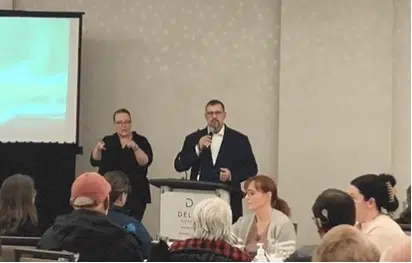Hundreds turned out to the Delta Beau in Moncton to express their opinions about a proposed French learning program.
It was the second of several consultations in the province, and the crowd was much larger than anticipated, and the majority of those who attended were opposed.
Liberal MLA Rob McKee was just one of the many who attended, “Just listening to the teachers, parents, everyone who was present last night, the concerns raised can be summed up. It’s a one size fits no one approach to education. Standardizing the program across the board is not going to meet the needs of all the children.”
He adds that as a parent of young school-aged children, he wants kids to have the options they need to get ahead whether they take French immersion or not.
“Some that go into French Immersion can have more of a challenge. Others might have learning difficulties or personal learning plans, and imposing on them 50% of the time in French can actually hurt their development, where they need more time learning, reading and writing in English,” McKee says.
The message is loud and clear tonight in Moncton. Scrapping French immersion is not the answer. // Le message est fort et clair ce soir à Moncton. L’élimination de l’immersion française n’est pas la solution. pic.twitter.com/HXinzdp2bg
— Rob McKee (@RobMcKeeMLA) January 20, 2023
The program is proposing a 50/50 split between French and English starting in Kindergarten, and it is expected to start in September for the 2023/2024 school year.
The percentage would be reduced to 60/40 as students advance to other grades.
“Looking at the global picture here, there are other issues that need addressing, like the English Prime program. Cutting the French Immersion program is not the solution. We need to look at what we can do to make the English Prime Program better, with more resources, and more investments to get kids that have those personal learning plans to get them ahead and get them the resources they need. That’s going to be the case no matter what the program looks like. We need extra resources for those kids that need the help,” McKee stated.
The Department of Education staff has been telling people to leave and go to another session in another city! They are staying, 4-5 hundred already here. pic.twitter.com/hKTeQUa4aJ
— Chris Collins 🇨🇦 (@ChrisCollins506) January 19, 2023
Numerous parents took to the microphone last night to express their thoughts, wondering where the data is to prove this new French learning program will be effective.
In response to Thursday night’s consultations in Moncton, Education Minister Bill Hogan offered this response, “We want to hear from all New Brunswickers about what we’re proposing and give everyone an opportunity to say what’s on their mind. People came out to our Moncton consultation and expressed their concerns; they expressed how they feel about the proposed framework. It’s important to hear all voices and that’s what we’re doing. I think every opinion is valuable. I really appreciated the teachers who got up and spoke because they’re living these realities every day, I’d like to see more teachers come out. We need open and honest discussion on our education system and how we can improve it. But we need collaboration in order to help us inform decision-making processes. We chose the world-café model because it allows each person who attends the chance to have deeper, meaningful discussions and really workshop challenges, solutions and opportunities as a team. That said, I do understand the emotional stake many New Brunswickers have on this matter – it’s very close to their hearts. I think many who came out last night needed the opportunity to share their voice. There were great points that were brought up last night, some of what was shared struck a chord with us, and we’re going to look at that as we move forward.”
More government consultations are planned in the coming weeks:
- Saint John – Delta Saint John on Tues Jan 24, 2023
- Fredericton – Delta Fredericton on Wed Jan 25, 2023
- Virtual – Tues Jan 31, 2023
- Virtual – Thurs Feb 2, 2023
Hogan adds, “Once the consultations end, we’re going to take everything we’ve learned from the first and second phases of consultations, including survey results, feedback from the public sessions and feedback from ongoing stakeholder discussions and we’ll share what we’ve heard and learned over the course of the past few months. This information will also help guide our decision-making. Our goal continues to be to rollout a program for this fall to ensure anglophone sector students graduate with a minimum of conversational French, starting with Kindergarten and Grade 1.”






Comments